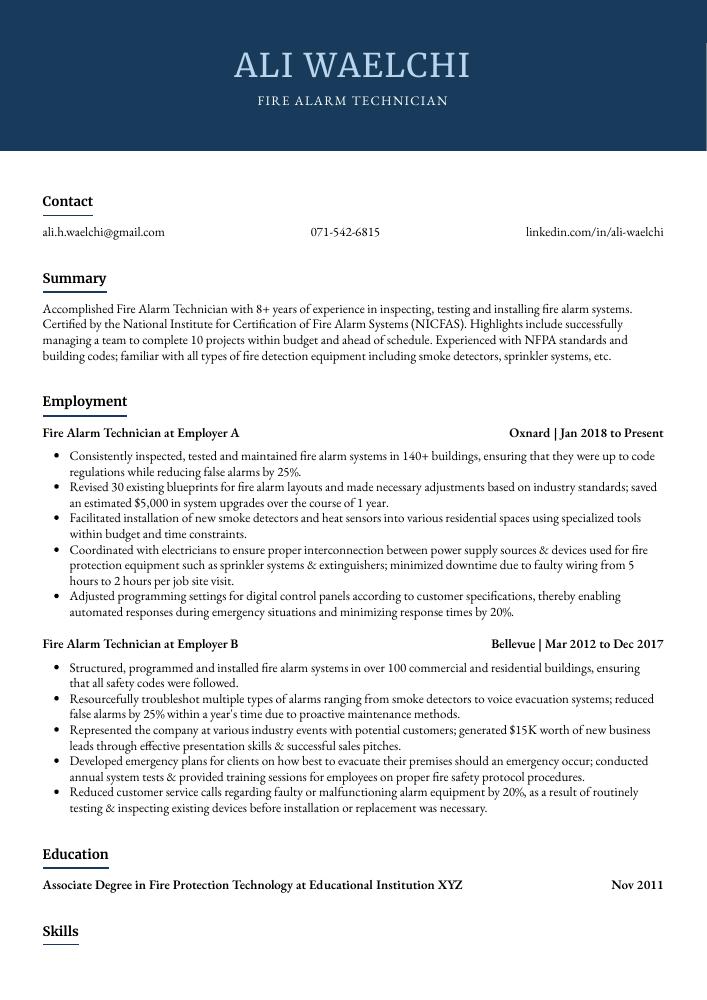Fire Alarm Technician Resume Guide
Fire alarm technicians install, inspect, maintain and repair fire alarms and other related systems. They ensure that all components are in working order so that they can effectively detect fires or any other emergency situations.
You have the technical know-how and experience to handle any fire alarm system, but potential employers don’t know about you yet. To make them aware of your expertise in this field, write a resume that stands out from the competition.
This guide will walk you through the entire process of creating a top-notch resume. We first show you a complete example and then break down what each resume section should look like.
Table of Contents
The guide is divided into sections for your convenience. You can read it from beginning to end or use the table of contents below to jump to a specific part.
Fire Alarm Technician Resume Sample
Ali Waelchi
Fire Alarm Technician
[email protected]
071-542-6815
linkedin.com/in/ali-waelchi
Summary
Accomplished Fire Alarm Technician with 8+ years of experience in inspecting, testing and installing fire alarm systems. Certified by the National Institute for Certification of Fire Alarm Systems (NICFAS). Highlights include successfully managing a team to complete 10 projects within budget and ahead of schedule. Experienced with NFPA standards and building codes; familiar with all types of fire detection equipment including smoke detectors, sprinkler systems, etc.
Experience
Fire Alarm Technician, Employer A
Oxnard, Jan 2018 – Present
- Consistently inspected, tested and maintained fire alarm systems in 140+ buildings, ensuring that they were up to code regulations while reducing false alarms by 25%.
- Revised 30 existing blueprints for fire alarm layouts and made necessary adjustments based on industry standards; saved an estimated $5,000 in system upgrades over the course of 1 year.
- Facilitated installation of new smoke detectors and heat sensors into various residential spaces using specialized tools within budget and time constraints.
- Coordinated with electricians to ensure proper interconnection between power supply sources & devices used for fire protection equipment such as sprinkler systems & extinguishers; minimized downtime due to faulty wiring from 5 hours to 2 hours per job site visit.
- Adjusted programming settings for digital control panels according to customer specifications, thereby enabling automated responses during emergency situations and minimizing response times by 20%.
Fire Alarm Technician, Employer B
Bellevue, Mar 2012 – Dec 2017
- Structured, programmed and installed fire alarm systems in over 100 commercial and residential buildings, ensuring that all safety codes were followed.
- Resourcefully troubleshot multiple types of alarms ranging from smoke detectors to voice evacuation systems; reduced false alarms by 25% within a year’s time due to proactive maintenance methods.
- Represented the company at various industry events with potential customers; generated $15K worth of new business leads through effective presentation skills & successful sales pitches.
- Developed emergency plans for clients on how best to evacuate their premises should an emergency occur; conducted annual system tests & provided training sessions for employees on proper fire safety protocol procedures.
- Reduced customer service calls regarding faulty or malfunctioning alarm equipment by 20%, as a result of routinely testing & inspecting existing devices before installation or replacement was necessary.
Skills
- Fire Alarm
- Fire Protection
- Troubleshooting
- Fire Safety
- Life Safety
- Alarm Systems
- Inspection
- Security
- Access Control
Education
Associate Degree in Fire Protection Technology
Educational Institution XYZ
Nov 2011
Certifications
Fire Alarm System Installer Certification
National Institute for Certification in Engineering
May 2017
1. Summary / Objective
The summary/objective at the top of your fire alarm technician resume is like a movie trailer – it should provide enough information to pique the interest of potential employers. In this section, you can showcase your best qualities and experience. For example, you could mention how many years of experience you have in installing and repairing fire alarms, any certifications or licenses that make you stand out from other applicants, and how quickly customers were satisfied with your work in the past.
Below are some resume summary examples:
Professional fire alarm technician with 5+ years of experience in installing, inspecting, and maintaining fire detection systems. Adept at using specialized tools to conduct tests on smoke alarms, sprinklers, and other devices to ensure proper functioning. Experienced in troubleshooting electrical circuits for alarm system malfunctions. Received commendations from supervisors for excellent workmanship during installations and repairs.
Well-rounded fire alarm technician with 10+ years of experience in the installation, maintenance and repair of fire safety systems. At XYZ, implemented a preventative maintenance program that reduced downtime by 50%. Awarded “Top Technician” for my expertise in troubleshooting complex problems and providing excellent customer service. Skilled at performing system audits to ensure compliance with NFPA codes and standards.
Skilled fire alarm technician with 10+ years of experience maintaining fire and life safety systems to meet strict industry standards. Adept at troubleshooting complex problems, performing inspections and repairs, providing training for new technicians, and managing projects from start to finish. Seeking a position at ABC Company where I can use my expertise in fire alarm technology to ensure the safety of customers.
Proficient fire alarm technician with 5+ years of experience installing, testing and maintaining fire detection systems. Skilled in troubleshooting system malfunctions and ensuring compliance to NFPA codes. Proven track record of designing cost-effective fire protection solutions for clients while meeting strict deadlines. At XYZ, handled installation projects for over 100 commercial buildings across the region.
Determined and detail-oriented Fire Alarm Technician with 5+ years of experience installing, repairing, and testing fire alarm systems for residential and commercial clients. Seeking to join ABC Fire Solutions in order to bring a client-focused approach that consistently delivers quality work on time. At XYZ Enterprises achieved an 82% customer satisfaction rate through timely communication and reliable service.
Energetic and detail-oriented Fire Alarm Technician with 5+ years of experience installing, inspecting and repairing fire alarm systems in residential, commercial and industrial settings. Experienced in identifying problems within the system quickly and accurately to reduce downtime. Proven track record for making sure all installations meet NFPA codes and standards while adhering to strict safety regulations.
Hard-working fire alarm technician with 8+ years of experience installing, troubleshooting, and maintaining fire alarm systems in commercial buildings. Achieved a 98% customer satisfaction rating for on-time completion and quality workmanship. Seeking to join ABC Fire Alarm Systems as a senior technician to provide superior service while keeping up with the industry’s latest developments.
Committed and experienced fire alarm technician with 8+ years of experience installing and maintaining systems. Proven track record in ensuring compliance to local codes, testing equipment, and resolving complex technical issues. Seeking an opportunity at ABC Company to help protect the public by providing exceptional service while delivering top-notch safety standards.
2. Experience / Employment
In the experience section, you should list your past jobs in reverse chronological order. This means that the most recent job is listed first.
When writing about what you did at each role, use bullet points to make it easier for the reader to digest the information quickly. You want to provide detail and quantify any results achieved when possible. For example, instead of saying “Installed fire alarms,” you could say, “Successfully installed over 100 fire alarm systems within a three-month period while adhering to all safety guidelines.”
To write effective bullet points, begin with a strong verb or adverb. Industry specific verbs to use are:
- Installed
- Inspected
- Programmed
- Repaired
- Tested
- Troubleshot
- Calibrated
- Configured
- Monitored
- Replaced
- Adjusted
- Certified
- Analyzed
- Upgraded
- Documented
Other general verbs you can use are:
- Achieved
- Advised
- Assessed
- Compiled
- Coordinated
- Demonstrated
- Developed
- Expedited
- Facilitated
- Formulated
- Improved
- Introduced
- Mentored
- Optimized
- Participated
- Prepared
- Presented
- Reduced
- Reorganized
- Represented
- Revised
- Spearheaded
- Streamlined
- Structured
- Utilized
Below are some example bullet points:
- Improved fire safety protocols in over 200 buildings by installing, inspecting and testing fire alarm systems; decreased false alarms by 25%.
- Effectively maintained and repaired existing fire alarms in 450+ residential and commercial buildings on a monthly basis.
- Participated in the installation of new smoke detectors, heat sensors, pull stations and other related devices to ensure compliance with state regulations.
- Certified Fire Alarm Technician (CFAT) with 3 years of experience diagnosing malfunctions using electrical meters & hand tools; updated knowledge through continuing education courses annually.
- Prepared detailed reports for all inspections performed outlining any needed repairs or parts replacements that were necessary for efficient operation of alarm systems across multiple sites daily.
- Replaced over 250 faulty fire alarm systems and components, ensuring that all safety regulations were met; reduced downtime by an average of 4 hours per repair.
- Configured new fire alarm systems according to customer specifications, testing the equipment for proper functioning with a 0% malfunction rate.
- Calibrated existing smoke detectors in over 100 residential and commercial buildings across the city monthly; successfully passed state-mandated inspections each time on schedule.
- Utilized specialized tools such as analysers, calibrators & testers to troubleshoot any issues with fire alarms quickly and efficiently while maintaining high quality standards at all times.
- Efficiently installed & maintained up-to-date sprinkler systems in 8 client sites within 6 months, leading to a 10% reduction in insurance costs for those businesses annually thereafter.
- Mentored 2 junior technicians in fire alarm systems installation and maintenance, resulting in a 20% increase of efficiency.
- Inspected 60+ fire alarms on commercial & residential properties every week; identified potential risks and suggested effective solutions to customers to ensure safety standards were met.
- Diligently tested fire alarms and sprinkler systems using specialized equipment according to NFPA codes; reduced customer complaints by 30%.
- Assessed over 100 buildings for compliance with local building codes and regulations regarding the placement of smoke detectors, heat sensors, manual pull stations etc.; successfully lowered false alarm rate by 40%.
- Analyzed data from quality control tests that evaluated compatibility between various parts used within complex electrical circuits; saved $1500 in repair costs due to early detection of issues before they caused damage or disruption.
- Optimized existing fire alarm systems for maximum efficiency and safety, resulting in a 15% reduction of false alarms.
- Presented detailed reports on the status of fire alarm installations to clients, which increased customer satisfaction by 20%.
- Competently troubleshot malfunctioning components and repairs within an average time frame of 2 hours per incident; reduced emergency repair costs by 25%.
- Compiled comprehensive documentation outlining all code requirements as well as system designs according to NFPA 72 standards; improved compliance with local regulations by 50%.
- Achieved 100% success rate in testing newly installed fire alarm systems before handover to clientele; enabled smooth transition for customers into their new buildings or facilities without any disruption or delays due to faulty equipment.
- Reliably installed, maintained and serviced fire alarm systems for over 400 residential, commercial and industrial properties; reduced false alarms by 22%.
- Documented all service records in the system database to ensure compliance with local safety regulations and standards.
- Introduced new digital monitoring technology that allowed remote diagnostics of fire alarms, resulting in an average response time reduction of 10 minutes per site.
- Repaired over 300 faulty components such as smoke detectors, heat sensors, manual call points and control panels within a timely manner while ensuring customer satisfaction at all times.
- Installed state-of-the-art fire suppression systems across 25 sites which saved $15k annually due to improved detection accuracy compared to traditional methods.
- Expedited installation and maintenance of fire alarm systems in 20+ commercial and residential buildings, ensuring compliance with state codes and regulations.
- Spearheaded the testing, troubleshooting & repairs of 400+ smoke detectors, heat sensors & pull stations; reduced response time to emergency calls by 30%.
- Accurately identified defective parts in fire alarms using a variety of complex diagnostic tools and equipment; cut costs on spare parts inventory by 10%.
- Streamlined the programming process for Fire Alarm Control Panels (FACPs) from 8 hours to 4 hours per installation project; increased efficiency by 50%.
- Advised building owners on safety protocols pertaining to fire alarm systems including proper placement/installation of devices and weekly check-ups for preventive maintenance purposes.
- Monitored and maintained over 500 fire alarm systems for clients, ensuring that all components were functioning properly and meeting safety codes; reduced false alarms by 17%.
- Developed comprehensive service plans to optimize the performance of fire alarm systems in commercial and residential buildings, resulting in a 25% improvement in response time when triggered.
- Tested existing wiring connections to ensure compatibility between smoke detectors, heat sensors, manual pull stations and other components with minimal disruption of services; completed projects within budget 95% of the time.
- Formulated detailed reports outlining maintenance activities performed on each system as well as any findings or recommendations based on inspection results while working independently without direct supervision; increased technician productivity by 10%.
- Independently diagnosed electrical issues related to fire alarm installations across multiple sites including hospitals, schools & factories using specialized testing equipment; identified root cause for 53 malfunctioning units within 3 months period with no repeat visits required afterwards.
- Substantially upgraded over 300 fire alarm systems and emergency lighting equipment in commercial, industrial, and residential buildings; reduced repair call-outs by 20%.
- Troubleshot intricate system malfunctions using specialized diagnostic tools such as multi-meters and oscilloscopes; resolved over 100 technical issues within 48 hours.
- Demonstrated exceptional knowledge of industry regulations when installing new control panels for smoke detectors, heat sensors and sprinkler systems according to local safety codes.
- Reorganized the entire inventory of spare parts in the workshop with updated labeling standards which improved operational efficiency by 25%.
- Successfully tested newly installed fire suppression systems on multiple occasions before completion to ensure maximum performance results were achieved every time.
3. Skills
Skill requirements will differ from employer to employer – this can easily be determined via the job advert. Organization ABC may be looking for someone with experience in installing and maintaining fire alarm systems, while Organization XYZ may require the candidate to have knowledge of state regulations pertaining to fire safety.
It is essential to tailor your skills section accordingly because many employers use applicant tracking systems these days, which are computer programs that scan resumes for certain keywords before passing them on to a human.
In addition to listing relevant skills here, you should also elaborate on the most important ones in other resume sections such as the summary or experience section.
Below is a list of common skills & terms:
- Access Control
- Alarm Systems
- AutoCAD
- CCTV
- Cabling
- Code Enforcement
- Construction Management
- Electrical Wiring
- Electricians
- Electronics
- Engineering
- Fire Alarm
- Fire Management
- Fire Protection
- Fire Safety
- Fire Suppression Systems
- IP Cameras
- Inspection
- Life Safety
- Low Voltage
- NFPA
- Project Planning
- Security
- Supervisory Skills
- Team Leadership
- Testing
- Troubleshooting
- Wiring
4. Education
Mentioning an education section on your resume depends on how far into your career you are. If you just graduated and have no prior experience, include the education below your resume objective. However, if you have significant work experience to showcase, omitting an education section altogether is perfectly fine.
If including an education section, try to mention courses and subjects related to fire alarm technician job that demonstrate a knowledge of the role’s responsibilities.
Associate Degree in Fire Protection Technology
Educational Institution XYZ
Nov 2011
5. Certifications
Certifications are a great way to demonstrate your expertise in a certain field. They show that you have taken the time and effort to gain specialized knowledge, which can be beneficial when applying for jobs.
Include any certifications relevant to the job you are applying for on your resume. This will give employers an idea of what specific skills or qualifications you possess that could make you stand out from other applicants.
Fire Alarm System Installer Certification
National Institute for Certification in Engineering
May 2017
6. Contact Info
Your name should be the first thing a reader sees when viewing your resume, so ensure its positioning is prominent. Your phone number should be written in the most commonly used format in your country/city/state, and your email address should be professional.
You can also choose to include a link to your LinkedIn profile, personal website, or other online platforms relevant to your industry.
Finally, name your resume file appropriately to help hiring managers; for Ali Waelchi, this would be Ali-Waelchi-resume.pdf or Ali-Waelchi-resume.docx.
7. Cover Letter
Submitting a cover letter alongside your resume is a great way to make yourself stand out from the competition. It gives you an opportunity to detail why you are a strong fit for the job and provide recruiters with more information about who you are as a professional.
A cover letter should be made up of 2-4 paragraphs, separate from your resume. It can include highlights of your skills or experiences that have not been mentioned in the CV but would still be beneficial for this role. Writing one is highly recommended when applying for jobs and can help increase your chances of being selected for an interview!
Below is an example cover letter:
Dear Floy,
I am writing to apply for the position of Fire Alarm Technician at ABC Company. As a certified fire alarm technician with 5+ years of experience installing, repairing, and maintaining fire alarm systems, I am confident I will be an asset to your organization.
In my previous role as a Fire Alarm Technician at XYZ Company, I was responsible for installation, repair, and maintenance of fire alarm systems in commercial and residential buildings. I have experience working with all major brands of fire alarms, including Kidde, Honeywell, and Notifier. In addition to my technical skills, I also have excellent customer service skills and am able to effectively communicate with customers regarding their needs.
I am knowledgeable of NFPA 72 codes and standards and hold a valid driver’s license. I am available to work evenings and weekends if necessary.
Please find attached a copy of my resume detailing my experience as a Fire Alarm Technician. I can be reached anytime via phone or email should you have any questions or need further information from me. Thank you for your time and consideration; I look forward to hearing from you soon about this opportunity.
Sincerely,
Ali
Fire Alarm Technician Resume Templates
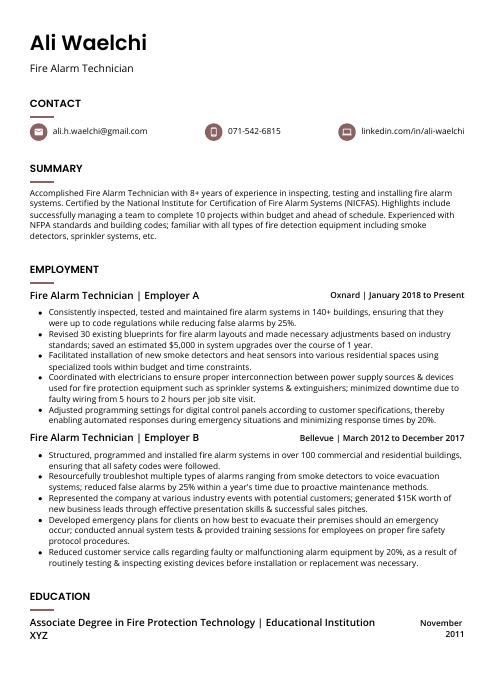 Fossa
Fossa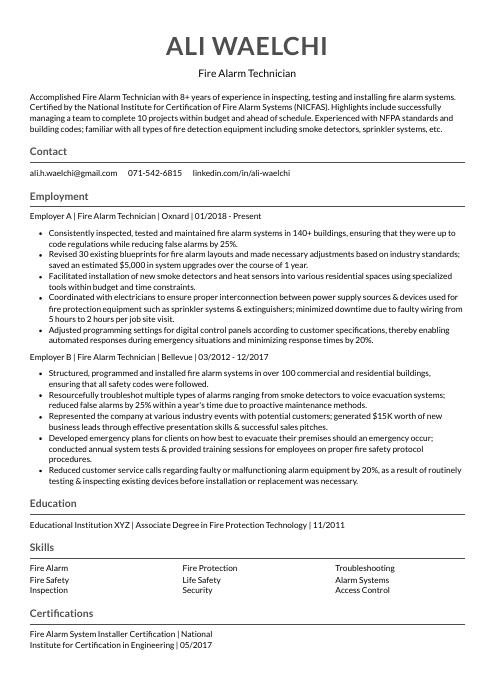 Indri
Indri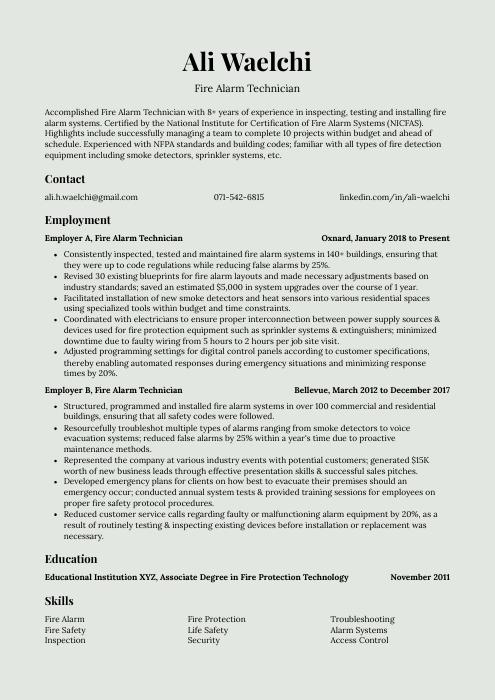 Saola
Saola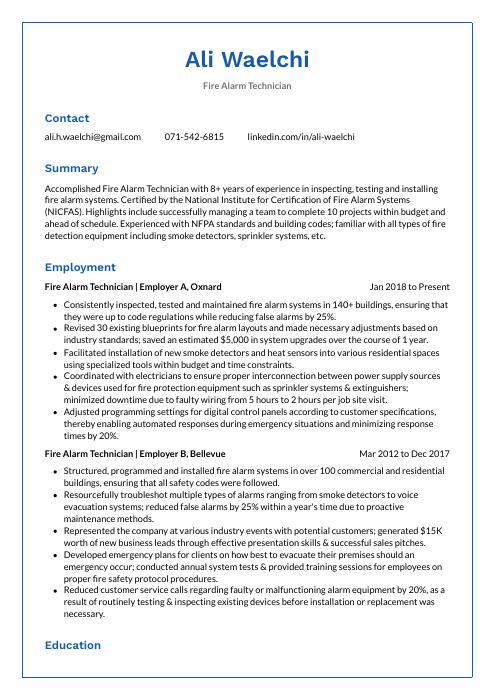 Markhor
Markhor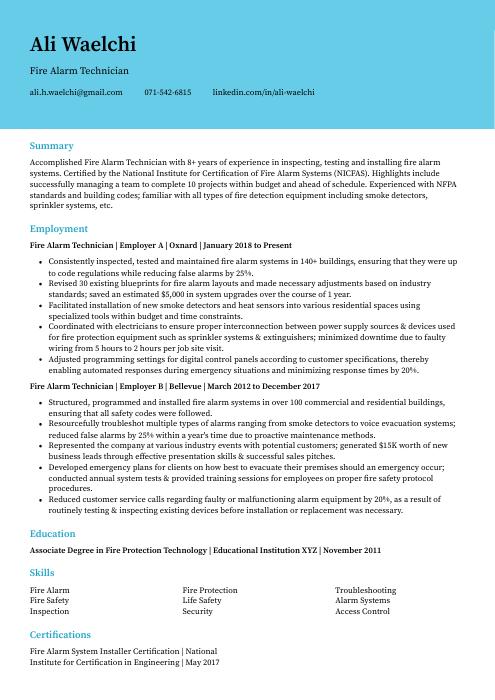 Dugong
Dugong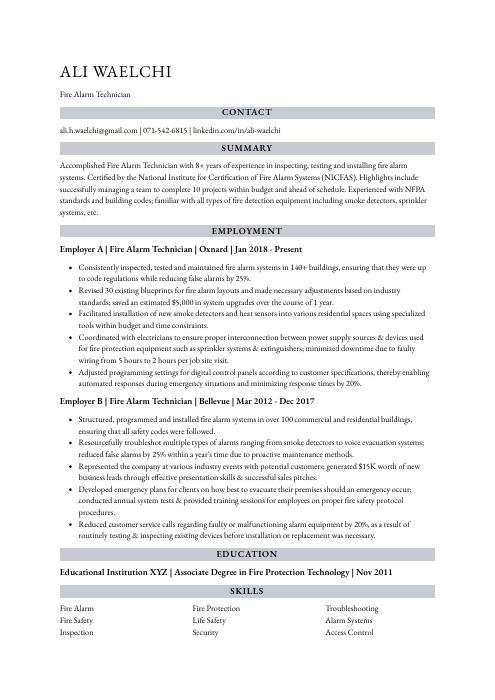 Numbat
Numbat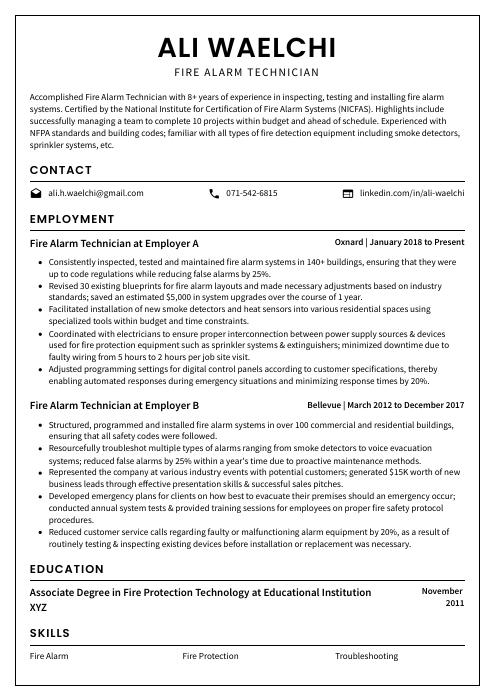 Cormorant
Cormorant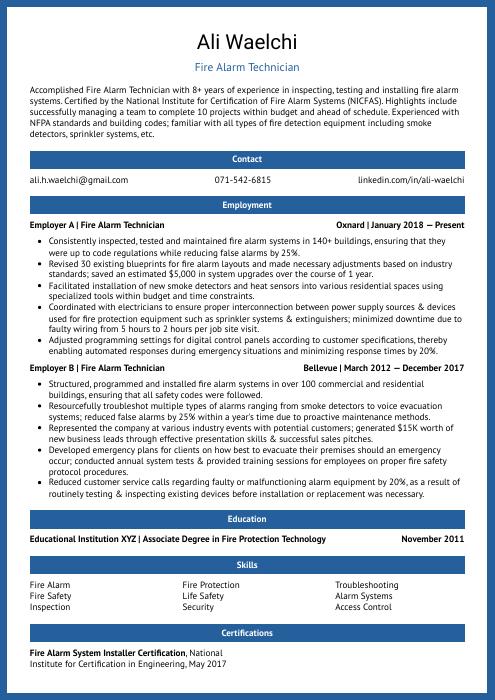 Ocelot
Ocelot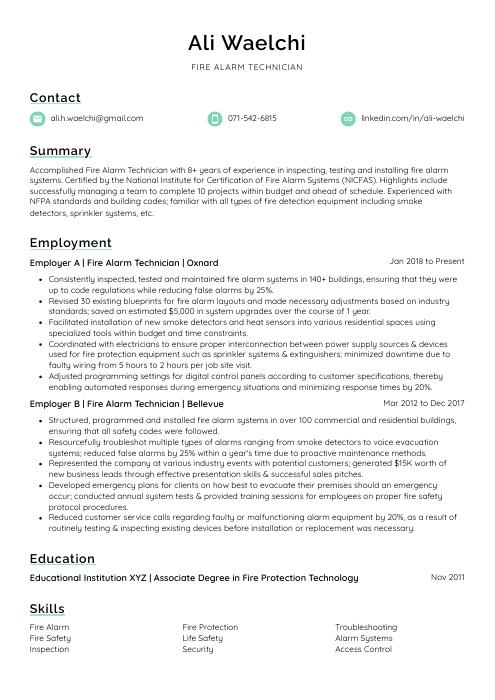 Lorikeet
Lorikeet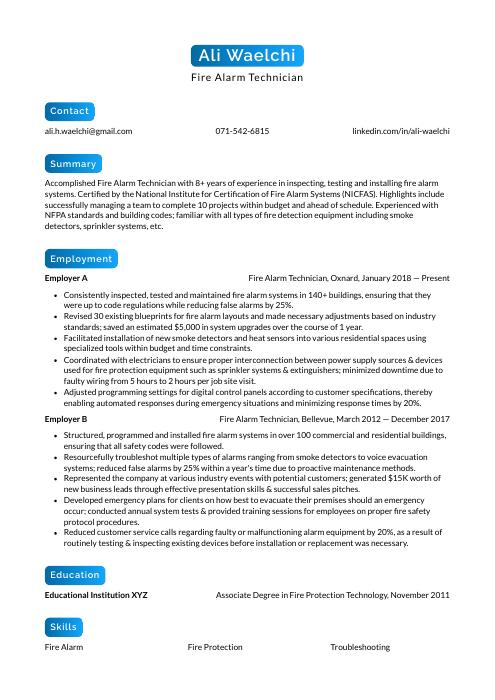 Kinkajou
Kinkajou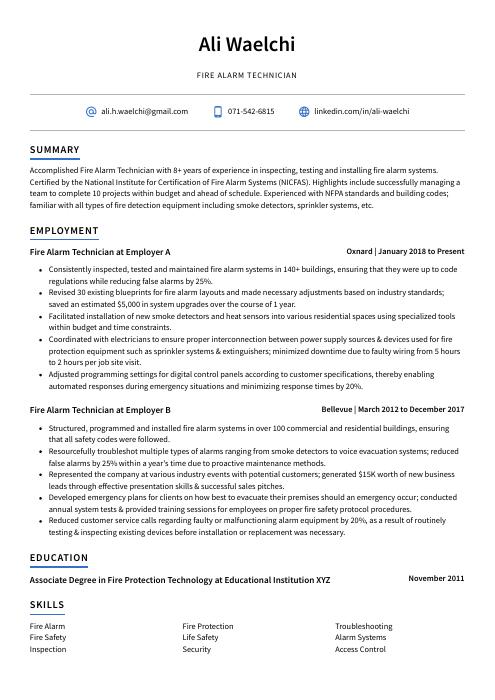 Axolotl
Axolotl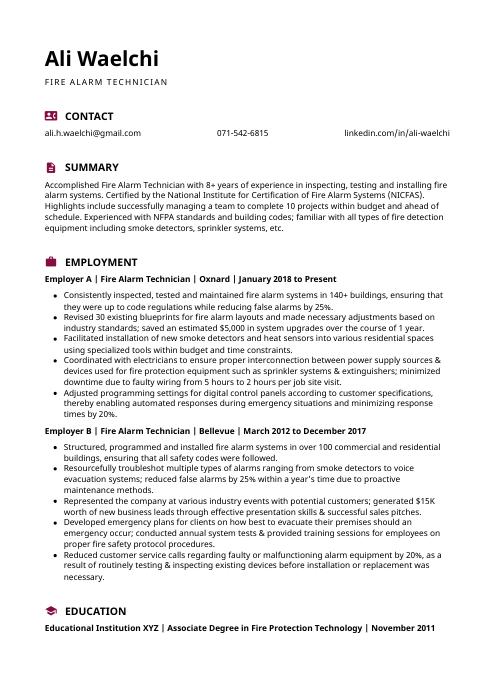 Hoopoe
Hoopoe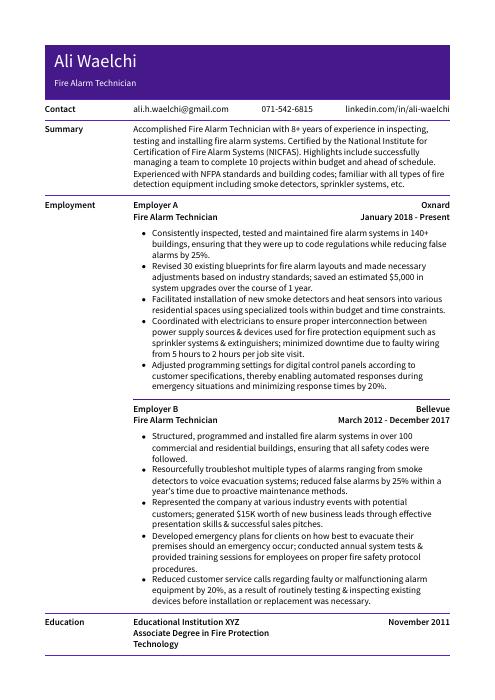 Pika
Pika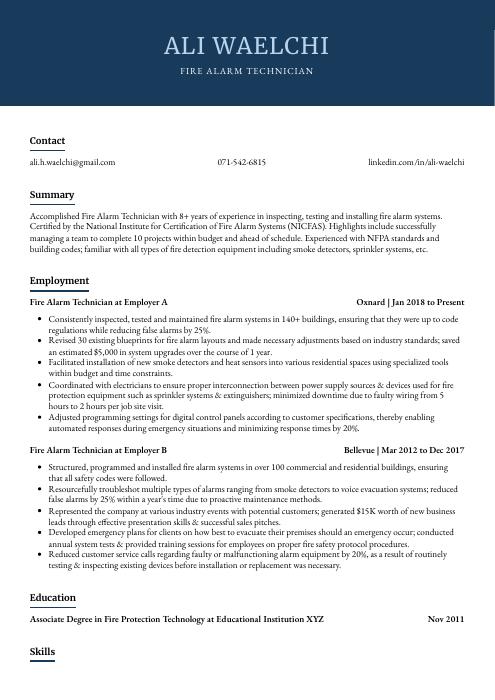 Bonobo
Bonobo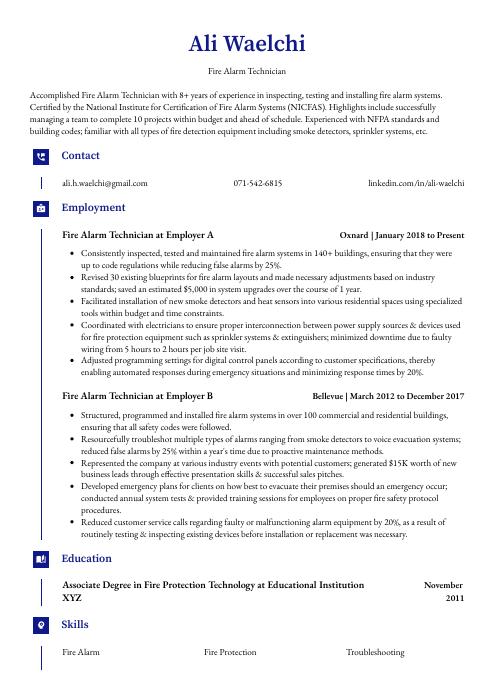 Gharial
Gharial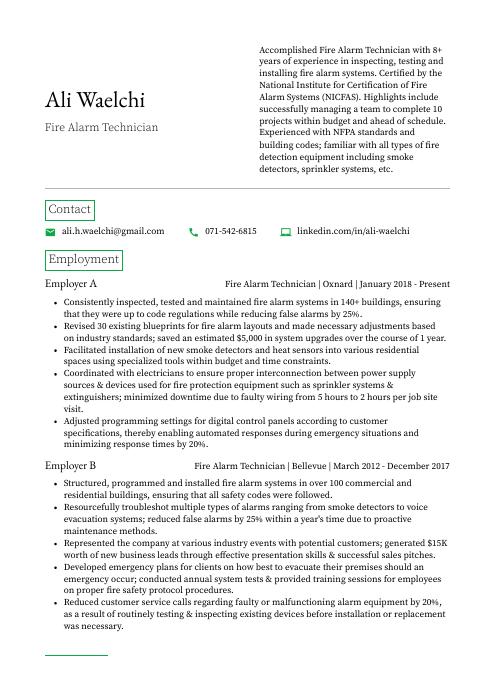 Quokka
Quokka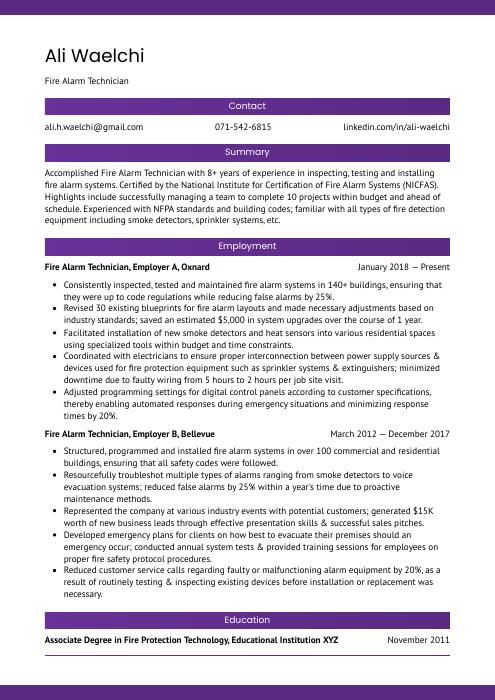 Jerboa
Jerboa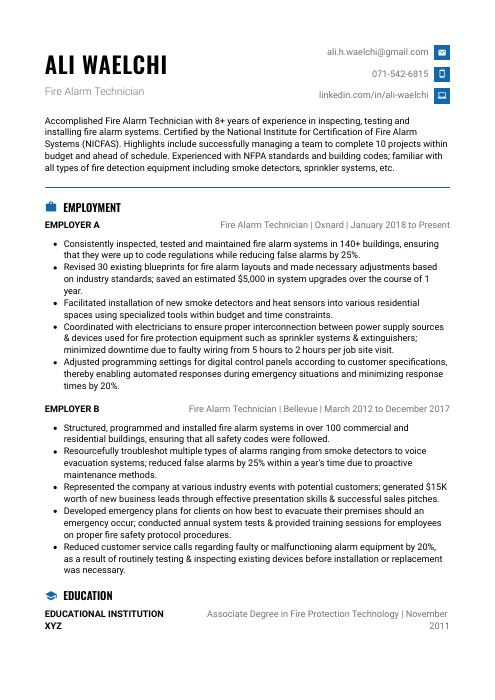 Echidna
Echidna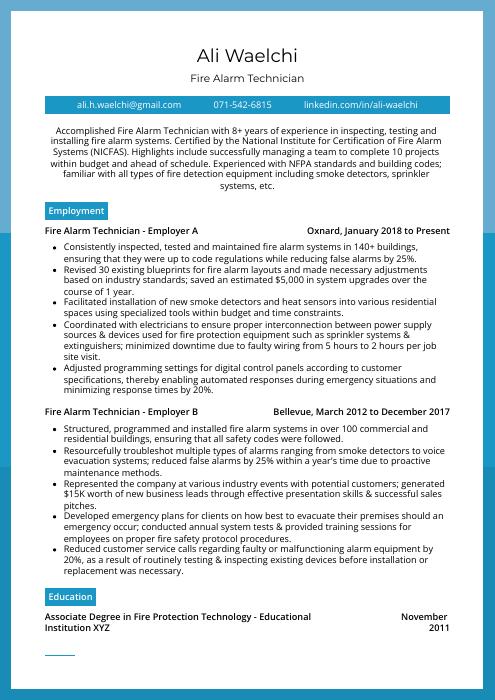 Rhea
Rhea Rezjumei
Rezjumei
